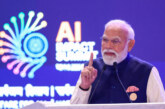Each year the World Economic Forum publishes a report looking ahead to the short term and long term risks facing organizations around the world. The 2021 Global Risks Report has now been published, alongside a call for the world to ‘wake up to long term risks’.

The report says that in 2020, the world saw the catastrophic effects of ignoring long-term risks. While the pandemic has shown the reality of such risks, the emergence of vaccines provides an exit. With other long term risks, such as environmental concerns, there will be no way out. Instead, understanding and acting on the threat in advance provides the only chance of reducing the impacts.
For the first time, the Global Risks Report rates risks according to when respondents perceive they will pose a critical threat to the world. Clear and present dangers (0-2 years) reveal concern about lives and livelihoods – among them infectious diseases, employment crises, digital inequality and youth disillusionment. In the medium-term (3-5 years), respondents believe the world will be threatened by knock-on economic and technological risks, which may take several years to materialize – such as asset bubble bursts, IT infrastructure breakdown, price instability and debt crises. Existential threats (5-10 years) – weapons of mass destruction, state collapse, biodiversity loss and adverse technological advances – dominate long-term concerns.
“In 2020, the risk of a global pandemic became reality, something this report has been highlighting since 2006. We know how difficult it is for governments, business and other stakeholders to address such long-term risks, but the lesson here is for all of us to recognize that ignoring them doesn’t make them less likely to happen. As governments, businesses and societies begin to emerge from the pandemic, they must now urgently shape new economic and social systems that improve our collective resilience and capacity to respond to shocks while reducing inequality, improving health and protecting the planet,” said Saadia Zahidi, Managing Director at the World Economic Forum.
The report also reflects on the responses to COVID-19, drawing lessons designed to bolster global resilience. These lessons include formulating analytical frameworks, fostering risk champions, building trust through clear and consistent communication, and creating new forms of partnership. The key risks outlined in the report are complemented with recommendations to help countries, businesses, and the international community to act, rather than react, in the face of cross-cutting risks. The report closes with an overview of ‘frontier risks’ – nine high-impact, low-probability events drawn from expert foresight exercises – including geomagnetic disruption, accidental wars and exploitation of brain-machine interfaces.
Post Source: https://www.continuitycentral.com/index.php/news/resilience-news/5859-world-economic-forum-releases-the-global-risks-report-2021



